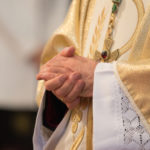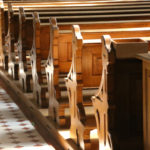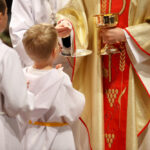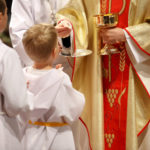Catholic Church Liable for Child Sexual Abuse by Priest

In what has been described as an Australian ‘legal first’, the Catholic Church has been found ‘vicariously liable’ for the child sexual offences committed by notorious Ballarat offender, priest Bryan Coffey, more than 50 years ago.
Father Coffey was convicted in the Ballarat County Court in February 1999 of multiple counts of sexual assault against children. He was given a three-year suspended prison sentence and died in 2013.
Legal changes pave the way for survivors to obtain compensation
Until recently, the Catholic Church was essentially immune from civil liability for criminal offences committed by members of its clergy.
This was known as the ‘Ellis Defence’, and it prevented victims from suing unincorporated organisations such as Churches.
But recent changes to the law in a number of Australian jurisdictions, including in Victoria and New South Wales, have paved the way for victims to claim damages against unincorporated organisations if it can be established there was a breach of the duty of care the body owed to a person who was abused, and the breach led to harm.
Survivor sues Church
One of the survivors of Father Coffey’s abuse has now successfully sued the Catholic Church for damages as well as aggravated damages on the basis that the Church enabled the child sexual abuser to access children at his home as well as the homes of others, and to continue committing offences against children.
Abused at the age of five
The man told the Victorian Supreme Court that Coffey had sexually abused him at his parent’s home on two occasions in 197. He was five years old at the time. The victim was five years old at the time.
Although the man had made a separate prior attempt to seek redress from the church with regard to a claim about a female school teacher, he did not mention abuse by Father Coffey at that time. The court heard that the man had not told his psychologists either, however after reading an advertisement in a newspaper for a law firm, the man said, memories of the abuse came back.
Vicarious liability
Justice Forrest accepted the man’s account, believing that on the balance of probabilities the abuse did occur. He also found that the abuse was consistent with accounts of abuse made by other victims of Father Coffey.
He awarded the man $200,000 in damages. But the more significant finding, believed to be the first of its kind in Australia, is that the church was found liable for aggravated damages.
“I can see no reason why the diocese should not be vicariously liable for such an award given that it relates directly to Coffey’s conduct and is compensatory in nature,” Justice Forrest remarked.
What is vicarious liability?
Vicarious liability is when a person or organisation is held accountable for the actions of another. In Australia, employers can be held legally responsible for acts of discrimination or harassment that occur in the workplace or in connection with a person’s employment, which includes:
- employer-sponsored events, such as seminars, conferences and training workshops,
- work-related social functions, such as Christmas parties, and
- business or field trips.
Employers can also be liable when computers, phones or tablets are used to harass a person; for example, by sending text messages, posting on social media sites or sending emails that have a connection to the workplace.
Vicarious liability provisions are contained in both the Racial Discrimination Act (1975) and the Sex Discrimination Act (1984).
More victims are coming forward and being acknowledged
Other victims of Father Coffey’s have been compensated via out-of court settlements, although they have confirmed the experience of many, that they had to fight the Catholic Church every step of the way.
Until recently, it has been notoriously difficult for victims to take legal action against the Catholic Church.
Many victims accepted paltry settlements and have tried to get on with their lives.
However changes to the law since the final report from the Royal Commission into institutional responses to Child Sexual Abuse have made it much easier for victims to seek redress.
Last year the NSW Government passed laws stopping historic gag orders and allowing unfair settlements to be again challenged in the courts. Other laws have made it a criminal offence for Catholic priests not to report abuse, using the sanctity of confession as a reason for not doing so.







